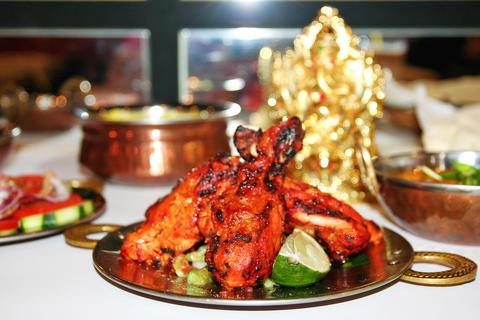It's not an inventive name for a restaurant but Calcutta Indian Food does what it says well. The brother-sister owners are Taiwanese from the West Bengal city and opened the restaurant in Ximending a couple of months ago. Hou Yong-tian (侯勇添) used to be the chef at Spice Shop in Tianmu, so the kitchen has pedigree.
Foreigners, including Indians, form a large portion of the pair's clientele, but locals are being lured in by competitively priced set meals in the week. These range from NT$190 for the vegetarian curry and NT$280 for the lamb, including a salad, soup or drink, nan bread or rice.
Most of the Indian subcontinent's better-known dishes are listed on the menu ("hot and spicy vindaloo," bhuna and madras) but the spicy hot lamb curry mass kolhapuri (a Marathi dish) was a surprise and there is an emphasis on creamy flavors such as pasanda and murgi malai. Side dishes are plentiful and the fiery laccha, a "Delhi-spice salad" is worth trying. Rice is saffron colored and there is a selection of nan breads.

PHOTO: JULES QUARTLY, TAIPEI TIMES
I've visited five or six times and the food has always been of a good standard. It is North Indian in character, according to the owners, tending toward stronger flavors. An example of this was the chicken tandoori, bright orange and baked until it was ever-so-slightly charred. The chicken was good quality and far removed in taste from some of the fake tandooris served up in this city.
Other highlights of previous meals included the iced Darjeeling tea, lemon soda, daal soup and a refreshing homemade milk rice dessert called firni. The channa masala, a chickpea dish with a sweetness balanced by a firm but fair chili kick, come recommended. The raita yogurt is a favorite with many Taiwanese, we were informed, and teased the taste buds. The worst crime as far as Indian food is concerned, is being boring.
The decor will be familiar to lovers of Indian food around the world: Colonial-period, patterned wallpaper in a deep ochre red, a mini chandelier, a few brass fittings and a couple of India-themed pictures. In addition to the usual "fortune cat" (招財貓) waving his paw at the cash desk there is a brass statue of Ganesh the elephant god. Service is informal and friendly.

This is a deeply unsettling period in Taiwan. Uncertainties are everywhere while everyone waits for a small army of other shoes to drop on nearly every front. During challenging times, interesting political changes can happen, yet all three major political parties are beset with scandals, strife and self-inflicted wounds. As the ruling party, the Democratic Progressive Party (DPP) is held accountable for not only the challenges to the party, but also the nation. Taiwan is geopolitically and economically under threat. Domestically, the administration is under siege by the opposition-controlled legislature and growing discontent with what opponents characterize as arrogant, autocratic

June 16 to June 22 The following flyer appeared on the streets of Hsinchu on June 12, 1895: “Taipei has already fallen to the Japanese barbarians, who have brought great misery to our land and people. We heard that the Japanese occupiers will tax our gardens, our houses, our bodies, and even our chickens, dogs, cows and pigs. They wear their hair wild, carve their teeth, tattoo their foreheads, wear strange clothes and speak a strange language. How can we be ruled by such people?” Posted by civilian militia leader Wu Tang-hsing (吳湯興), it was a call to arms to retake

When Lisa, 20, laces into her ultra-high heels for her shift at a strip club in Ukraine’s Kharkiv, she knows that aside from dancing, she will have to comfort traumatized soldiers. Since Russia’s 2022 invasion, exhausted troops are the main clientele of the Flash Dancers club in the center of the northeastern city, just 20 kilometers from Russian forces. For some customers, it provides an “escape” from the war, said Valerya Zavatska — a 25-year-old law graduate who runs the club with her mother, an ex-dancer. But many are not there just for the show. They “want to talk about what hurts,” she

It was just before 6am on a sunny November morning and I could hardly contain my excitement as I arrived at the wharf where I would catch the boat to one of Penghu’s most difficult-to-access islands, a trip that had been on my list for nearly a decade. Little did I know, my dream would soon be crushed. Unsure about which boat was heading to Huayu (花嶼), I found someone who appeared to be a local and asked if this was the right place to wait. “Oh, the boat to Huayu’s been canceled today,” she told me. I couldn’t believe my ears. Surely,